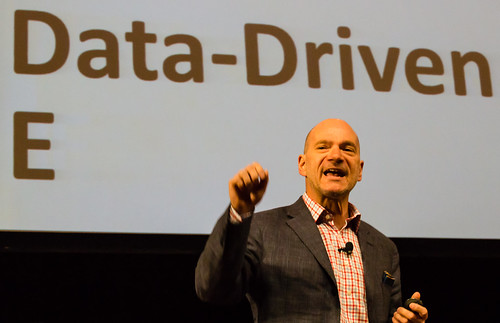"Going with your gut is out." That line, from Russell Reynolds Associates managing director Shawn Banerji, neatly summed up a big chunk of yesterday's MIT Sloan CIO Symposium. There was discussion of the computing side of things as well. I especially liked EMC CTO John Roese's description of public clouds evolving to a "chaotic" (as in heterogeneous/hybrid) pool of resources in which special purpose clouds would have specific functions. But the majority of the day revolved around data.
Not necessarily "big data" by the way. One panelist—Jack Norris of MapR—even remarked that the "big data term is probably short lived." But, rather, the pervasive use of data, in whatever form and at whatever speed, to drive decision-making. As Annabelle Bexiga, the CIO of financial services firm TIAA-CREF put it: "Big data is just a richer set of data. [It's a] natural evolution of where data is going."
Erik Brynjolfsson (above) is the Director of the MIT Center for Digital Business. He spoke to how the data explosion was a revolution of technology but was also (and required) a revolution in management.
He offered the example of publishing, described as historically a "culture of lunches"—which is to say a culture of hunches and people networks. But Amazon brought a culture of numbers to the industry. And things haven't been the same since.
A 2011 paper, which Brynjolfsson co-authored with Lorin Hitt and Heekyung Hellen Kim found that data-driven decision making at firms resulted in 5 percent higher productivity than at firms which weren't so data oriented.
Brynjolfsson also discussed what might be called ambient data, data collected almost incidentally from sources such as cell phone records. He offered the example of streetbump in Boston, which uses an iPhone app to find potholes. At the same time, he observed that the app did best at finding potholes in the Back Bay, Beacon Hill, and other relatively upscale Boston locales. Why? Because that's where iPhones predominate. As Sloan's Andrew McAfee would elaborate on in his closing keynote (paraphrasing science fiction author William Gibson), "the future is already here. It's just unevenly distributed."
The panel which Brynjolfsson moderated also touched on some of the privacy issues associated with this ambient data. The MIT Media Lab's Sandy Pentland told how a big data commons, created by French telco Orange, was used to reduce commuting times in the Ivory Coast by 10 percent by rearranging bus routes using location-based data from mobile phones. Pentland went on to note, with more of a bit of understatement, that this sort of thing is politically controversial in places like the UK.
For his closing keynote, Andrew McAfee (above) took as his jumping off point a fascinating graph that appears in Ian Morris' Why the West Rules—For Now. At the risk of offering up spoilers, the central thesis of the book is that, viewed from the perspective of today, the level of worldwide social development prior to the industrial revolution is effectively in the noise.
(Although McAfee didn't get into this, the answer to the book title's question is basically that the West was better positioned to create and take advantage of the industrial revolution when the factors making it possible came together. It's a great read. If nothing else, it's a good history of the world from the perspective of the Western and Eastern core.)
The industrial revolution had such an impact because it overcame the limitations of human muscles. (I suppose, given farm animals, it would be more accurate to say it overcame the limits of human and domesticated mammal muscles generally.) In any case, though, McAfee's thesis that that today we're starting to overcome the limitations of our individual minds.
He laid out four elements to this:
Cyborgs—as in new combinations of people and machines.
Open—which will define successful organizations in a variety of ways. (If you want to delve more deeply into this thought, I point you to a presentation I gave at ProductCamp Boston a few weeks back.)
Data-driven—because for the first time we have data-driven visibility in all sectors of the economy.
Evolving—for which McAfee offered the example of the car rental industry which evolved only incrementally since it was founded after the Second World War but has seen the introduction of radically new services made possible by the Web and mobile phones from Zipcar to Lyft.
So it's more than data. But data—along with the compute needed to operate on it and the networks needed to move things around and tie them together—is a common thread. Big challenges lie in gaining access to the right data, even within single organizations. Cutting across data silos was also a theme heard more than once throughout the day. Asking the right questions matters too. As McKinsey's Michael Chui summed up that thought: "Be data driven. But don't suck at it."



No comments:
Post a Comment